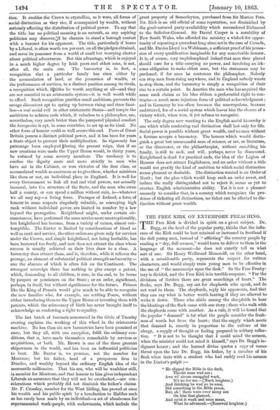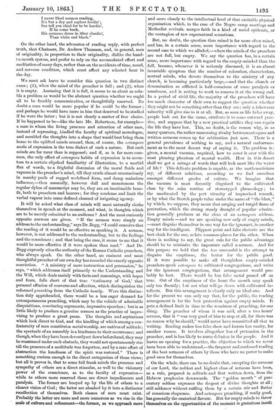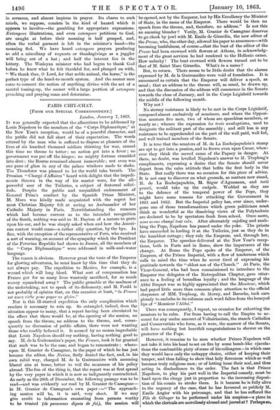THE FREE KIRK ON EXTEMPORE PREACHING. THE Free Kirk is
divided in spirit on a great subject. Dr..
Begg, at the head of the popular party, thinks that the influ- ence of the Kirk could be best retained or increased in Scotland if the dull young men, instead of "afflicting" the country people by- reading a "dry, dull sermon," would learn to deliver to them in the- language of the moment—he does not exactly tell us what sort of one. Sir Henry Wellwood Moncreiff, on the other hand,. with a considerable party, represents the respect for written characters, and would simply train young men to be effective in the use of "the manuscript upon the desk." So the Free Presby- tery is divided, and the Free Kirk is in terrible suspense. "For the divisions of Reuben there are great searchings of heart." The flocks., says Dr. Begg, cry out for shepherds who speak, and do not read to them. The shepherds, reply his opponents, find that they can say what is better worth hearing if they are allowed to. write it down. Those who abide among the sheepfolds to hear- the bleatings of the flock come with one story ; those who walk with the shepherds come with another. As a rule, it will be found that the popular "demand" is for what the people consider the fresh- ness of words hot from the heart ; that the supply which meets that demand is, exactly in proportion to the culture of the clergy, a supply of thought or feeling prepared in solitary reflec- tion. "It is not to be thought that I could mind the sermon, when the minister could not mind it himself," says Dr. Begg's in- dignant hearer ; and the learned divine quotes a copy of verses. thrust upon the late Dr. Begg, his father, by a member of his. flock when irate with a student who had rashly read his sermon. in the Doctor's pulpit :— " He slipped the Bible in the dark,
Thocht nane wad see ; Awa wP siccan smuggled wark, It's no for me.—(Much laughter.)
And thinking he wad no be seen,
Did something in the Bible preen, But, ah ! there were ower mony een On him that glanced, And ca'ed it weak and unco mean, What he advanced.—(Renewed laughter.) I never liked sermon reading, It's but a dry and sapless feedin' ; Sae tell yon chiel for to be heedin', If he come back,
ills sermons dress in ither cleediu', Than white and black."
On the other hand, the advocates of reading reply, with perfect truth, that Chalmers, Dr. Andrew Thomson, and, in general, men of originality, in proportion to their originality, dislike the hand- to-mouth system, and prefer to rely on the accumulated effort and meditation of many days, rather than on the accidents of time, mood, and nervous condition, which must affect any selected hour in the day.
We must ask leave to consider this question in two distinct cases ; (1), when the mind of the preacher is full ; and (2), when it is empty. Assuming that it is full, it seems to us about as solu- ble a problem as would be the abstract question whether we ought all to be frankly communicative, or thoughtfully reserved. No doubt a man would be more popular if he could be the former ; and perhaps he would have more in him that deserved to be studied if he were the latter ; but it is not clearly a matter of free choice. If he happened to be—like the late Mr. Robertson, for example— a man in whom the living presence and attention of other men, instead of repressing, kindled the faculty of spiritual monologue, and moulded the thoughts into a shape that would best bring them home to the uplifted minds around, then, of course, the extempore mode of expression is the true dialect of such a nature. But such minds are far rarer than is supposed; and if, as is far more com- mon, the only effect of extempore habits of expression is to accus- tom to a certain slipshod familiarity of illustration, to a morbid flux of words, to a frightful distension of the moral fluids and vapours in the preacher's mind, till they exude almost unconsciously in marshy pools of ragged undefined form, and damp malarious influence,—then assuredly, however dull and monotonous the regular dykes of manuscript may be, they are an inestimable bene- fit, both to preachers and hearers ; for they condense and limit the verbal vapour into some defined channel of irrigating agency.
It will be asked what class of minds will most naturally clothe themselves in speech at the moment, and what, in thoughts which are to be merely submitted to an audience ? And the most curiously opposite answers are given. "If the sermon were simply an address to the understanding," says Dr. Begg, "I could conceive that the reading of it would be as effective as speaking it. A sermon, however, is not addressed to the understanding, but to the feelings and the conscience ; and that beingthe case, it seems to me that it would be more effective if it were spoken than read." And Dr. Begg expressly cites the authority of the Roman Catholic preachers, who always speak. On the other hand, an eminent and most thoughtful preacher of our own day has recorded the exactly opposite conviction. "A ministry of mere instruction and persuasion," he says, "which addresses itself primarily to the Understanding and the Will, which deals mainly with facts and reasonings, with hopes and fears, falls short of that true 'testimony of God,' that personal effusion of converse and affection, which distinguishes the reformed preaching from the Catholic homily. Were this distinc- tion duly apprehended, there would be a less eager demand for extemporaneous preaching, which may be the vehicle of admirable disquisitions, convincing arguments, impressive speeches ; but is as little likely to produce a genuine sermon as the practice of impro- vising to produce a great poem. The thoughts and aspirations which look direct to God, and the kindling of which among a con- fraternity of men constitutes social worship, are natives of solitude; the spectacle of an assembly is a hindrance to their occurrence; and though, when they have been devoutlyset down beforehand, they may be reassumed under such obstacle, they would not spontaneously rise till the presence of a multitude was forgotten, and by a rare effort of abstraction the loneliness of the spirit was restored." There is something curious enough in the direct antagonism of these views; but all it proves is, that to some full frank minds the presence and sympathy of others are a direct stimulus, as well to the visionary power of the conscience, as to the faculty of expression— while to others more reserved these are direct impediments and paralysis. The former are buoyed up by the life of others to a clearer vision of God ; the latter are abashed by it into a distincter recollection of themselves. Both classes of men must exist. Probably the latter are more and more numerous as we rise in the scale of culture and refinement—the former, as we approach more and more closely to the intellectual level of that excitable physical organization which, in the case of the Negro camp meetings and Methodist revivals, merges faith in a kind of social epidemic, or the contagion of raw supernatural sensations.
But, no doubt, the question thus raised is far more often raised, and has, in a certain sense, more importance with regard to the second case to which we alluded,—where the minds of the preachers are not full, but empty. We say the question has, in a certain sense, more importance with regard to the empty-minded than the full, because, whenever it is seriously discussed, it is an almost invariable symptom that the number of colourless, characterless, neutral minds, who devote themselves to the ministry of any church, is becoming particularly large,—and that the church or denomination so afflicted is half-conscious of some paralysis or numbness, and is setting to work to remove it at the wrong end. In a period of vivid life, the majority of the preachers will have too much character of their own to suggest the question whether they might not be something other than they are; only a lukewarm minority will give rise to it at all. But, as soon as life fades away, people look out for the cause, attribute it to some outward prac- tice, and suppose that by a new practical artifice they can regain the life they have lost. This, no doubt, is the reason why, in so many quarters, the rather unmeaning rivalry between extempore and written sermons comes up for arbitration just now. There is a general prevalence of nothing to say, and a natural embarrass- ment as to the most decent way of saying it. The problem is : given, a mental vacuum, required, how to cover it over with the most pleasing phantom of mental wealth. How in this desert shall we get a mirage of words that will look most like the water of life ? This delicate problem is capable, as the mathematicians say, of different solutions, according as we find ourselves amongst different grades of culture. We imagine that the vacuum is most decently disguised to the cultivated class by the calm routine of stereotyped phraseology ; to the uneducated by the pert vivacity of improvised remark, or by what the Scotch people value under the name of "the blast," by which, we suppose, they mean that surging and turgid flame of peroration, which the strong steady draught of popular admira- tion generally produces at the close of an extempore address. Empty minds —and we are speaking now only of empty minds, —must disguise themselves in one way for the ignorant, in another way for the intelligent. Flippant point and false rhetoric are the best cloak for the one, sedate common-places for the other. When there is nothing to say, the great rule for the public advantage should be to minimi7e the imposture called a sermon. And for this purpose we hold that the less successful is the attempt to disguise the emptiness, the better for the public good. If it were possible to make all thoughtless empty-minded preachers speak extempore to cultivated congregations, and write for the ignorant congregations, that arrangement would pro- bably be best. There would be less false metal passed off as true. Out of the emptiness of the heart the mouth may speak only too fluently; tut not what will go down with cultivated in- tellects. But this arrangement is clearly only an ideal one. And for the present we can only say that, for the public, the reading arrangement is far the best protection against empty minds. It puts a defined limit in time to the weariness of preaching, for one thing. The preacher of whom it was said, after a two hours' sermon, that it "was very good of him to stop at all, for there was no reason why he should," would never have committed all that to writing. Reading makes less false show and fosters less vanity, for another reason. It involves altogether less of pretension in the preacher, and is less likely to nurse delusion in the people. And it leaves an opening for a practice, the objection to which we never have been able to understand,—the frequent and confessed reading of the best sermons of others by those who have no power to make good ones for themselves.
On the whole, there can be no doubt that, excepting the sermons of our Lord, the noblest and highest class of sermons have been, as a rule, prepared in solitude and first written down, from the Hebrew prophecies downwards. The "golden mouth" of pure oratory seldom expresses the deepest of divine thoughts at all ; still seldomer without ruffling them by a certain stir and flutter of conscious eloquence. And extempore preaphing, if really good, has generally the oratorical flavour. But for empty minds to throw themselves on the opportunities of the moment is gratuitous insult in sermons, and almost impious in prayer. Its charm to such minds, we suppose, consists in the kind of hazard which it appears to involve—the gambling for appropriate expressions. Extempore illustrations, and even extempore petitions to God, are caught at before their meaning is half grasped, and, often the verbal garment is left in the minister's hand—the meaning fled. We have heard extempore prayers producing as odd a miscellany of requests or thanksgivings as a juggler will bring out of a hat ; and half the interest lies in the lottery. The Wesleyan minister who had begun to thank God before he knew what he felt thankful for, and plunged on with, "We thank thee, 0 Lord, for that noble animal, the horse," is the perfect type of the hand-to-mouth system. And the sooner men cease to connect the notion of anything divine with the act of a mental tossing-up, the sooner will a large portion of extenzpore preaching and praying cease and determine.
































 Previous page
Previous page